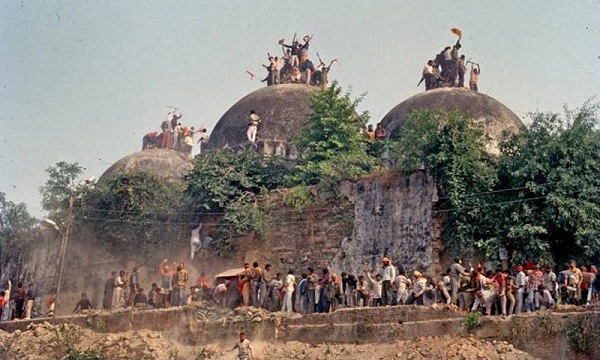 New Delhi : The Uttar Pradesh government on Friday questioned the Muslim litigants in the Ramjanmabhoomi-Babri Masjid title suit case for making “belated efforts” seeking a relook at the 1994 Ismail Farooqui judgment that had said that mosques were not an integral part of religious practice of offering prayers.
New Delhi : The Uttar Pradesh government on Friday questioned the Muslim litigants in the Ramjanmabhoomi-Babri Masjid title suit case for making “belated efforts” seeking a relook at the 1994 Ismail Farooqui judgment that had said that mosques were not an integral part of religious practice of offering prayers.
The bench of Chief Justice Dipak Misra, Justice Ashok Bhushan and Justice S. Abdul Nazeer was told that the Muslim parties did not question the 1994 verdict’s legality till the appeal against 2010 Allahabad High Court judgment on the ownership of the disputed land was taken up for hearing by the top court.
Additional Solicitor General Tushar Mehta, appearing for the state, described as “belated efforts” to avoid the adjudications of the long-pending cross appeals against the high Court judgment on the title suit.
Ayodhya appeals were pending in the top court since 2010 and all through the legality of 1994 judgment was never questioned but why this belated effort now, he asked.
The Lucknow bench of Allahabad High Court had by its 2010 verdict had divided the disputed 2.77 acres site between the Nirmohi Akhara, the Lord Ram deity and the Sunni Waqf Board.
Muslim parties are seeking the revisiting a conclusion in the 1994 constitution bench judgment which said that the mosque was not an essential and integral part of the Muslim religious practice of offering namaz and they could offer prayers in open under the sky.
Appearing for lead petitioner M. Siddiqui represented by his legal heir, senior counsel Rajeev Dhavan told the court told the court that the paragraph in the 1994 judgment which says that mosque was not essential to the Muslim religious practices and integral to it was said without examining the tenets of Islam.
He said that there was nothing in the judgment as to show how the court arrived at such a conclusion.
“If you have to say something say it after detailed examination,” Dhavan told the bench pointing to some judgments wherein the top court pronounced on some religious places after detailed examinations of the issues involved.
At this Justice Bhushan observed that nobody was questioning that mosque is essential to Islam but the question is whether offering namaz in a mosque was essential.
Dhavan will address the three judge bench on the issue on July 13 when he will advance arguments to meet the submissions made by the Hindu parties including that the issues being raised by him on mosque not being essential; part of Islamic practices have become res judicata (matter that has been adjudicated and decided) and the issues advanced by senior counsel K. Parasaran and Harish Salve in the course of their arguments.
Dhavan is seeking a relook at the 1994 judgment, contending that 2010 Allahabad High Court judgment relies on this conclusion of the top court.
He on Friday argued that a congregation at the mosque at the time of offering Namaz was essential for Muslims and “if congregation part of Islam is taken away, a large part of practice collapses”.
However, lawyers representing the Hindu parties said that reference to 1994 judgment in no way impacted the 2010 High Court judgment.
Appearing for deity Ram Lalla Virajman, senior advocate K. Parasaran in the last hearing of the matter on May 17, had told the court that the birthplace cannot be shifted to another site, while a mosque with no particular religious significance to the Muslims can be shifted as that will “not affect the right to practice religion by offering ‘namaz’ in other mosques”.
He had argued that to go on a pilgrimage is a practice of religious faith for the Muslims as well as the Hindus, but for the Muslims, “Makkah and Madinah alone are places of particular significance” as pilgrimage centres, but for them such was not the case with Ayodhya/Babri Masjid.
—IANS
Leave a Reply